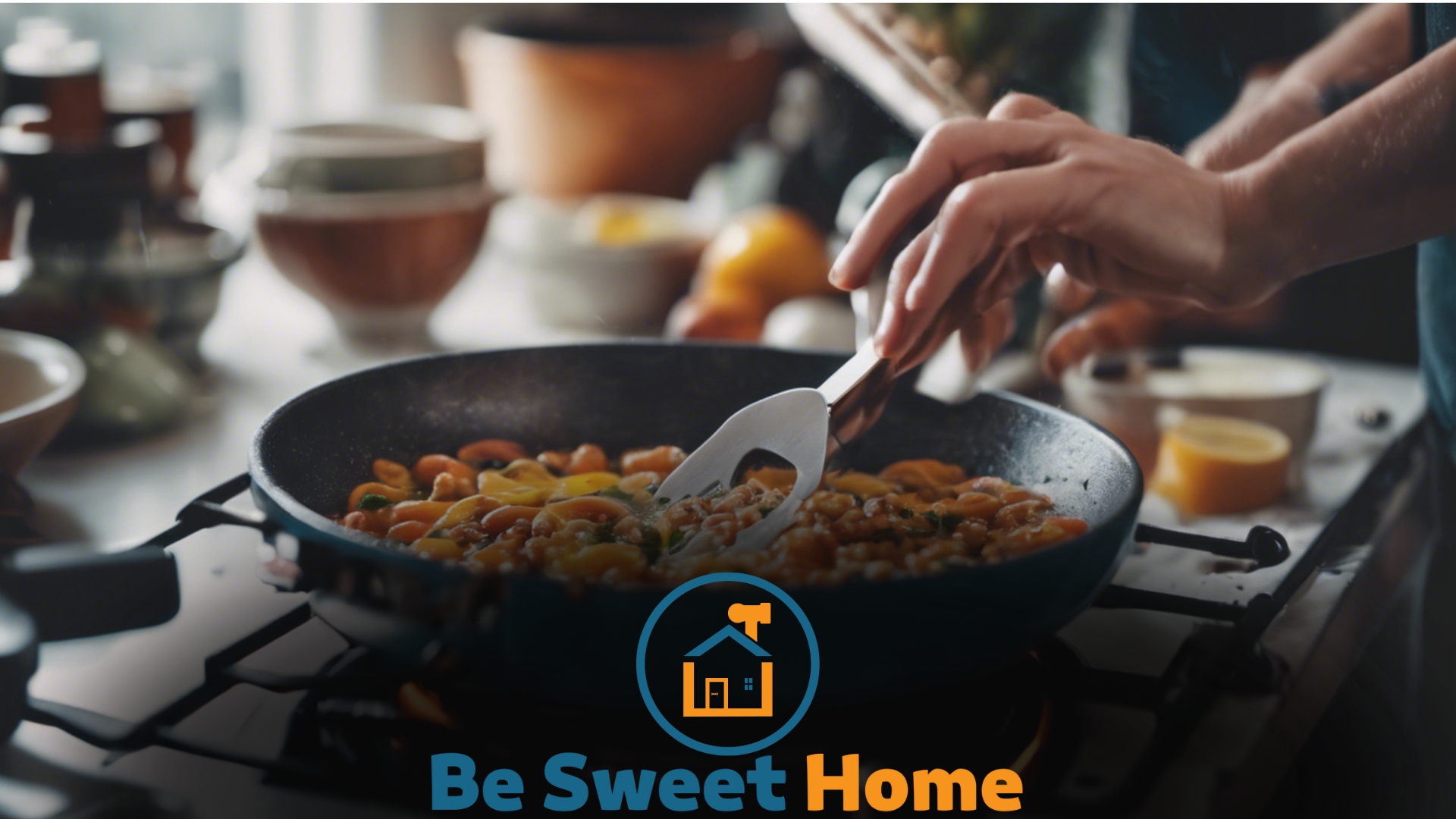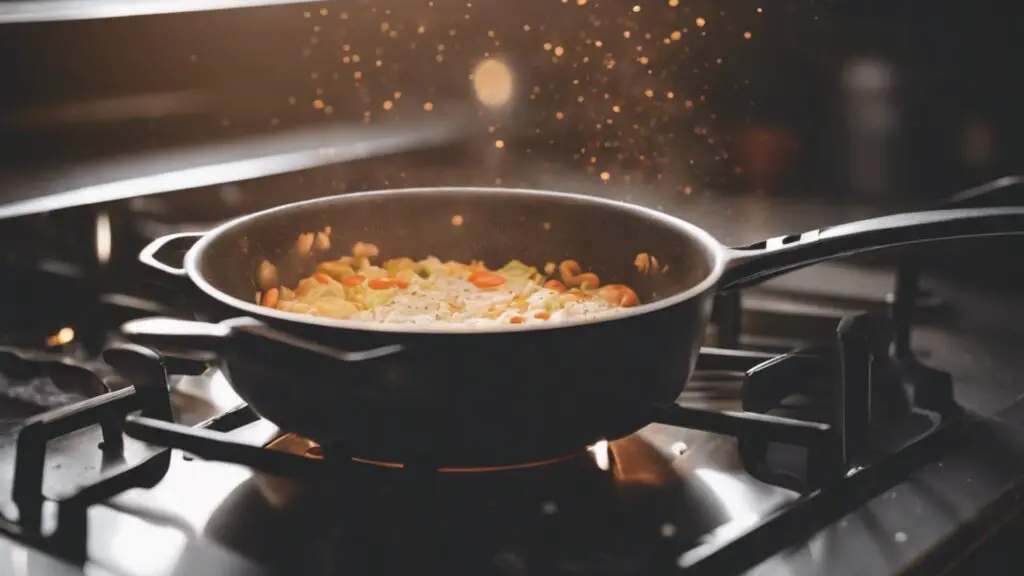

Beginners in cooking should start with basic recipes and maintain a well-organized kitchen. Use simple techniques before advancing to complex dishes.
Embarking on the home cooking journey can be exciting and daunting for novices.
A practical starting point is to focus on fundamental cooking methods like boiling, sautéing, and baking. Such skills form the foundation for more elaborate culinary adventures.
A tidy kitchen with utensils in reach streamlines the cooking process and reduces stress. Reading recipes thoroughly before starting is crucial, ensuring a clear understanding of the steps involved. Remember, practice breeds confidence.
Your cooking repertoire will naturally expand as you experiment with different flavors and ingredients. Patience and a willingness to learn from mistakes turn beginners into seasoned home chefs.
Embracing creativity while sticking to basic principles is the secret to gaining culinary proficiency.
Starting Your Culinary Journey


Welcome to the exciting world of home cooking! Beginning your culinary journey is an adventure that will bring joy, creativity, and delicious meals to your table.
Learning some basic tips can make this voyage even more enjoyable. Let’s get you set up for success in the kitchen!
Choosing the Right Tools
A craftsman is only as good as their tools, and the same holds for chefs. Selecting the right kitchen equipment is a critical first step.
Here’s what you’ll need to begin:
- Chef’s knife: For chopping, dicing, and slicing.
- Cutting board: A sturdy surface for all your prep work.
- Set of pots and pans: Versatile for varying cooking methods.
- Measuring cups and spoons: Precision is key in recipes.
- Mixing bowls: Essential for combining ingredients.
Stocking Essential Ingredients
Having the right ingredients is like having a palette of flavors to paint your culinary masterpieces. Start with these staples:
| Oils & Vinegars | Spices & Herbs | Pantry Basics |
|---|---|---|
| Salt & PepperGarlic powder dried basil | Salt & pepper garlic powder dried basil | RicePastaCanned tomatoes |
Remember, these are just starting points. Tailor your toolkit and pantry to fit the cuisines you love most. Embrace the process, and enjoy every step of your culinary journey.
Mastering Basic Techniques
Starting your culinary journey can be exciting and a tad overwhelming. Being comfortable with simple cooking techniques paves the way to becoming a confident cook.
These foundational skills will transform kitchen time from daunting to delightful. Let’s slice into the basics and set you on track for making mouth-watering meals!
Learning to Chop Like a Pro
Chopping is a cornerstone of cooking. It’s essential for preparing ingredients quickly and evenly.
- Keep knives sharp: A sharp knife is safer and more efficient.
- Use the right knife for the job: A chef’s knife for most tasks, a paring knife for small items.
- Master various cuts: dice, mince, julienne, and chiffonade.
- Practice makes perfect: Start slowly to get the technique, then speed up.
Sautéing, Boiling, and Baking Basics
Sautéing
For quick cooking, heat the pan first, then add oil. Add ingredients once the oil shimmers. Keep food moving for even cooking.
Boiling
Start with cold water for vegetables and seasoned boiling water for pasta. Know the perfect timing for ‘al dente’ or fully cooked.
Baking
Follow recipes precisely for the best results. Preheat the oven. Measure ingredients accurately. Use timers to avoid overbaking.
| Technique | Tip | Common Use |
|---|---|---|
| Sautéing | Keep stirring | Vegetables, meats |
| Boiling | Season the water | Pasta, eggs |
| Baking | Accurate temperature | Cakes, breads |
By building these basic techniques, you’ll soon be creating dishes with confidence and ease.
The journey to becoming a kitchen star begins with mastering the basics. Put on that apron and turn those ingredients into culinary victories!
Understanding Flavors and Seasoning
Embarking on a culinary journey often begins with a deep dive into the essence of taste: flavors and seasoning.
A dabble of salt here, a splash of vinegar there—every pinch and teaspoon can transform a bland dish into a remarkable culinary experience.
Mastering seasonings means understanding the wide spectrum of flavors that can pivot a meal from mundane to mouthwatering.
The Art of Balancing Tastes
Becoming a flavor virtuoso in the kitchen starts with balancing the five basic tastes: sweet, sour, salty, bitter, and umami.
Achieving harmony among these tastes can elevate any dish. Implement these basic guidelines:
- Sweet: counterbalances salty and sour flavors.
- Sour: brightens dishes, offering contrast.
- Salty: enhances inherent flavors of ingredients.
- Bitter: adds complexity and offsets sweetness.
- Umami: provides depth and savoriness.
Experiment by adding a touch of honey to a lemon vinaigrette or a pinch of salt to a chocolate dessert. These small additions can balance and intensify the overall taste of your dishes.
Herbs and Spices to Transform Dishes
Herbs and spices are the magicians of the culinary world, with the power to turn an ordinary dish into an extraordinary adventure.
Each herb and spice carries its unique profile, which, when used correctly, can create a symphony of flavors. Explore this simple guide to start:
| Herb/Spice | Dish Type | Flavor Profile |
|---|---|---|
| Basil | Pizzas, pastas | Sweet, peppery |
| Cinnamon | Desserts, stews | Warm, earthy |
| Cumin | Curries, soups | Nutty, spicy |
| Rosemary | Ross, breads | Piney, lemony |
| Turmeric | Rices, sauces | Bitter, ginger-like |
Starting with these building blocks, you’ll soon be able to master flavoring and create standout meals. Remember the golden rule: always taste as you go, and season confidently.
Efficient Kitchen Habits
Stepping into the world of cooking can be thrilling yet challenging for beginners. To make the journey smoother, adopting efficient kitchen habits is key.
Cooking Clean and Organized
Keeping a kitchen clean and organized is essential. It makes cooking faster and more enjoyable.
- Start with a clear workspace – Remove clutter from the counters before cooking.
- Use containers and labels – Organize ingredients so you can find them quickly.
- Clean as you go – Wipe spills and wash tools while you cook to avoid a pile-up.
Invest in racks and shelves to keep tools within reach.
| Task | Tip |
|---|---|
| Measure and Prep | Do this before cooking to save time. |
| Chopping Vegetables | Store in clear bowls to grab easily. |
Time-saving Cooking Strategies
Preparation can make a big difference in saving time.
- Plan meals – Decide what to cook ahead to prevent last-minute decisions.
- Batch tasks – Chop all vegetables or measure all spices at once.
- Use appliances – Slow cookers and pressure cookers save time.
Remember to keep essential tools handy and prioritize multitasking-compatible recipes.
Create a cooking schedule to help manage time better.
Experimenting With Recipes
Embarking on a culinary journey opens a world of flavors and textures. Beginning cooks often stick to recipes closely.
Over time, it’s exciting to step out of the comfort zone. That’s where experimenting with recipes comes into play.
This approach turns cooking into a form of art. Discovering personal preferences and refining cooking skills becomes an adventure.
Adapting Recipes to Your Taste
Tweak flavors to align with your taste buds. Are you a fan of garlic? Add an extra clove—or two! Prefer less salt? Reduce it. Love spicy meals? Throw in some extra chili flakes.
Here’s how to customize recipes safely:
- Adjust seasonings gradually, tasting as you go.
- Boldly substitute herbs. Try basil, where parsley is listed.
- Swap out proteins. Use tofu instead of chicken if you prefer.
Creating Your Signature Dish
A signature dish is a personal trademark. It showcases your unique flavor profiles and cooking style. Here are steps to craft one:
- Pick a base recipe that you already enjoy.
- Blend in ingredients that speak to you.
- Test and refine until it feels right.
- Name your dish with a fun, memorable title.
Remember, cooking is about expression and joy. Your creation will tell your story.
Common Mistakes and How to Avoid Them
No one’s perfect in the kitchen, especially when you’re just starting. Common cooking pitfalls are easy to sidestep with some insider info.
This section lists all you need to know to avoid typical cooking mishaps. Addressing these common oversights, turn fledgling food prep faux pas into culinary triumphs.
Overcoming Overcooking
Too much heat can turn a succulent steak into shoe leather. Overcooking is one of the top mistakes beginners make. But, with a few tips, this is entirely avoidable:
- Time it right: Use a timer. Guesswork isn’t your friend here.
- Feel the heat: Understand your stove’s settings.
- Thermometers are key: An instant read can save your dish.
Don’t forget to rest meat after cooking. It keeps cooking even off the heat!
Bouncing Back From Baking Blunders
Baking is a science, and accuracy is everything. Mistakes in baking can lead to dense cakes or sad, flat cookies.
- Measure correctly: Use appropriate measuring cups for wet and dry ingredients.
- Room temperature matters: Some recipes need butter at room temp.
- Know your oven: Ovens vary, so an oven thermometer can ensure the right temp.
Follow the recipe closely and don’t skip steps for the best results.
Frequently Asked Questions
What Are the 5 Basic Cooking Skills?
The five basic cooking skills are chopping and knife, heat management, measuring and mixing, recipe comprehension, and timing coordination.
What Are the 5 Golden Rules of Cooking?
The five golden cooking rules are: read recipes thoroughly, prep ingredients before starting, taste as you go, maintain knife skills, and clean as you cook.
How Can a Beginner Start Cooking?
Begin cooking by choosing simple recipes with few ingredients. Gather all necessary utensils and ingredients.
Read the entire recipe before starting. Practice basic cooking techniques like chopping and sautéing. Start cooking, adjusting flavors to taste.
What Are the 4 Basic Rules of Cooking?
The four basic cooking rules are:
- Read the recipe thoroughly.
- Prepare ingredients before starting.
- Maintain proper hygiene and.
- Monitor cooking temperatures.
What Are Basic Cooking Techniques?
Cooking beginners should start with essential techniques like boiling, sautéing, roasting, grilling, and baking. These foundational methods form the building blocks of many recipes.
Conclusion
Stepping into the kitchen can be a delightful adventure. Embrace these tips to boost your cooking confidence and skill set.
Keep practicing, experimenting, and enjoying the process. With patience and creativity, you’ll transform from a novice to a savvy home chef.
Bon appétit on your culinary journey!







